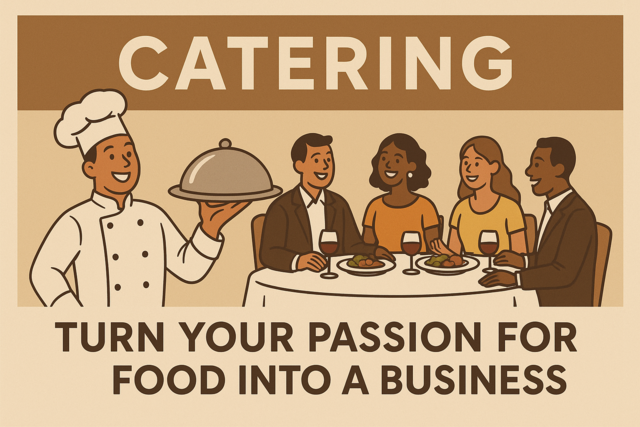As a special event planner, you will develop a very close relationship with a team of independent contractors, known as vendors. These people supply everything from flowers, cake, special effects lighting, and fog machines to food and beverages.
No event can function without the use of vendors. This is an area that can get very complicated for the individual planning an event who has absolutely no experience and no contacts. Whom should you hire to cater? How do you know that the cake will be delivered on time and to the right location? What happens if your vendor is unreliable?
| Your Job as Director |
As the event coordinator, your job is to be the director of the script. Your clients will give you the specifics of what they want and need for their event. You then reach out for your Rolodex, Blackberry, or computer database and get to work.
If your client wants a 1/5 scale model of the Titanic, your job is to know who can provide such an item. You do not have to provide it yourself, but you do have to know who can and will do it well.
You have to know who will be reliable and responsible. Your vendors absolutely cannot let you down. Your job as an event planner is difficult enough without having to second-guess your vendors. They absolutely must do what they contract to do, they must do it well, and they must be on time. It does not matter that your sister-in-law's big brother is starting a tent business. If his tents fail in a light breeze or he shows up an hour late or not at all, this will damage your reputation.
You are only as good as the people you contract to fulfill your needs and requirements.
What you do is make the initial contact, pose the request, give the vendors the specifics, and then verify immediately prior to the event that they will be there.
As stated previously, your relationship with the following vendors and others as your needs change will vary according to the event you are planning. For some events, your client wants only referrals to vendors and will then create a specific relationship with those vendors. Your job may be to confirm details, especially as the date of the event approaches.
Other times, your client will hire you and depend entirely on you to provide any and all of the services that will be outsourced to various vendors. Because it is your name on the line, you have to know these vendors very well, and have binding contracts for each event.
| Floral Designers |
The difference between a florist and a floral designer is that a florist can be an owner of a flower shop, or an employee of a flower shop, but has no specific training in floral design. A designer is trained to create art using flowers. Some designers specialize in exotic flowers, Oriental design, or weddings. Most designers continue to take ongoing classes and seminars in floral design and are always adding something new to their portfolio.
| Interior Decorators |
These folks learn all about color, design, and how to put it all together to create an atmosphere. In your career as an event planner, you likely will work with interior decorators/designers from time to time, especially when you are creating a theme event that needs a fair amount of time.
| Bakers and Pastry Chefs |
Some people get into this field because they have gone to culinary school, others because they are naturally good bakers. Most renowned bakers and pastry chefs will have studied and apprenticed with someone in the field who has established an excellent reputation. Those in this field excel when their fantastic creations taste as good as they look. It takes much more than just being good enough; you have to strive to be the best. These people will have pictures of their creations, and they also will have testimonials from satisfied customers available for you to read.
| Chef |
A chef is an individual who cooks as a profession. This individual can own or co-own his or her own restaurant, and is responsible for taking care of menu planning, food preparation, and presentation. Chefs often are consulted in the course of event planning because they are food experts. A consultation with a chef will allow you to prepare an event that is seamless from start to finish. A Hawaiian-themed luau may not support a menu of Beef Wellington and a 10-tiered chocolate cake for dessert.
| Caterers |
| Vendor-to-planner Transition |
| Confirming Details |
| Timelines |
| Troubleshooting |
This will be the area where a professional event planner will shine. During each of the steps of the timeline, there is bound to be something that will go wrong: Something unexpected may happen, critical personnel may cancel, the speaker may develop laryngitis, etc. A special event planner is someone who can think quickly, make an instantaneous decision, and have it be the right decision.
| How to Get Paid |
Getting paid is one of the primary goals of being in any kind of business. Planning special events is no exception. Getting paid in this business involves signing contracts, taking deposits, and sometimes being assertive when it comes to getting paid.
Most event planners prefer to start with a softer touch; a phone call reminder is the first step, followed by an e-mail. In the e-mail, refer to your previous attempts to contact him or her with times and dates.
| Creating a Good Contract |
Trademark and copyright permission: You also may need permission from the following in order to prepare materials for your event, broadcast music, use text materials, photographs, advertisements, drawings, and drama pieces. Always check the copyright of the materials you intend to use. Copyright infringement is a serious offense and is punished accordingly.
-
Copyright permission may be obtained from one of the two major U.S. music-licensing companies, Broadcast Music International (BMI) and the American Society of Composers, Authors, and Publishers (ASCAP).
-
Trademark permission must be obtained because distinctive trademarks are protected. If you intend to use a brand name in your literature, you must obtain permission first.
| Insurance Needs |
In the special event planning business, the crystal ball foretelling the future is pretty hazy. You never can guarantee that everything will turn out as planned. For this reason, you need to be aware of various insurance programs that will protect you and your clients.
A sad fact of today's society is that when things go wrong, the first course of action is to bring suit against the offending party. Events are at very high risk of facing a lawsuit, and as a planner you need to understand this and protect yourself against potential losses by understanding insurance policies and how they affect you, your business, and your clients. Do not risk being unprotected.
Your Insurance Needs
Here are just a few things that could possibly go wrong with an event:
-
Weather conditions disrupt travel or cause the cancellation of outdoor activities.
-
Venue damage is caused by fire, wind, or flood.
-
The venue becomes unavailable because of a double-booking mistake.
-
Speakers and/or entertainers do not show up as promised.
-
Power goes out or other essential production resource fails.
-
A quarantine or travel restriction is declared because of an outbreak of infectious disease.
-
Reduced attendance stemming from an unforeseen event leads to a loss of revenue. This can be devastating for fundraising events.
-
Damage occurs to personal property or that belonging to the venue.
-
Business reputation is lost.
-
Travel arrangements are delayed or disrupted because of bad weather, road blockage, or another unforeseen event.
Some of the possible types of insurance you may wish to consider include:
-
general liability insurance;
-
event cancellation;
-
promoter liability;
-
participant legal liability coverage;
-
liquor liability;
-
third-party property damage;
-
participant and spectator medical benefits;
-
weather;
-
fire;
-
flood;
-
earthquake;
-
accidental death and dismemberment;
-
rental equipment;
-
workers' compensation (for when you start hiring employees);
-
health insurance;
-
key man (or employee) life or disability insurance;
-
business property;
-
business Interruption;
-
unlimited certificates of insurance.
The vast majority of your events will go off without a single legal concern. It is only the smallest percentage that may have a problem, one big enough to actually cancel an event. In this case, the monetary loss could be enormous. Considering that there are all types of dangers, both natural disasters and the willful actions of people, you need to have insurance before putting on your next special event.
Your client also will need to consider obtaining insurance for the event. If you are not contracting with each vendor and venue yourself, your client must carry the appropriate insurance before a contract can be signed. This may cost your client only a few hundred dollars, but can protect against the loss of thousands of dollars' worth of event costs.
Client event insurance will protect your client should a vendor go out of business prior to the event. Should a vendor have a fire or a flood at his or her place of business, event insurance can protect against a loss, such as photography, as the insurance will pay for the photographs to be replaced. Should an event need to be postponed or canceled because of bad weather or some other unforeseen circumstance, the client's event insurance will cover these losses. It also can cover lost or damaged gifts and lost clothing, such as a bridal gown, on the day of the wedding. Client event insurance will cover damage to the venue and usually is worded to cover personal liability on the part of your client.
Many clients will balk at obtaining event insurance until they understand what it could cover. They would think nothing of insuring their $10,000 car, but until they realize that their event could cost that much or 10 times as much, they begin to see why event insurance is so important.
Some venues carry their own insurance, but some will require that your client buy additional coverage. A certificate of insurance is the document that outlines what will be covered with this type of insurance. Proof of liability is the evidence that your client will have to provide to the venue that the necessary insurance has been purchased.
Such insurance can start at a couple of hundred dollars and go on up to over $10,000, depending on the event that is insured, the venue, the duration of the event, and everything that is covered. Handling insurance matters is a very necessary task for you as an event planner.
























